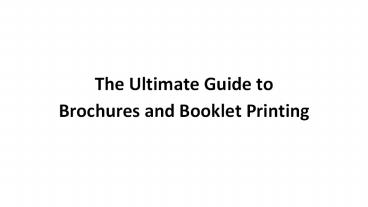The Ultimate Guide to Brochures and Booklet Printing - PowerPoint PPT Presentation
Title:
The Ultimate Guide to Brochures and Booklet Printing
Description:
A booklet is simply sheets of paper that have been bound together. It is an umbrella term for all catalogues, magazines, brochures. A brochure is an integral printed marketing material. Brochure making is essential for all enterprises as it serves as the perfect introduction to your business. – PowerPoint PPT presentation
Number of Views:39
Title: The Ultimate Guide to Brochures and Booklet Printing
1
The Ultimate Guide to
Brochures and Booklet Printing
2
The Ultimate Guide to Brochures and Booklet
Printing
- A booklet is simply sheets of paper that have
been bound together. It is an umbrella term for
all catalogues, magazines, brochures. A brochure
is an integral printed marketing material.
Brochure making is essential for all enterprises
as it serves as the perfect introduction to your
business. Brochure printing services providers
should know each and every detail about brochure
making for creating effective printed brochures.
Here is the ultimate guide to brochures and
booklet printing - Choose your paper
- Decide on the paper thickness
- Booklet cover
- Binding
- Bleed area
- Quiet area
- Brochures design
3
The Ultimate Guide to Brochures and Booklet
Printing
1) Choose your paper Choosing a type of paper
for your brochure is an important decision to
make. The texture of your brochure design is a
great deal. Each type of paper has a different
look, feel and texture to it. Silk, gloss and
uncoated are some of the many paper options
available. 2) Decide on the paper thickness
Paper thickness is measured in gsm (Grams Per
Square Metre) and is the next decision to make.
Generally, the preferred size should be 115 to
130gsm for interior papers and 170 to 250gsm for
cover papers. Make sure that your paper is
neither too thick, nor too thin.
3) Booklet cover Thick front and back covers
make your booklet look more professional and
protect the inner pages. Covers are available in
silk, gloss, uncoated, etc. Sometimes theres
self-cover, i.e. there are no cover pages and the
first page of a booklet effectively becomes the
front cover. You must also laminate the cover
pages so as to prevent the booklet from wear and
tear. Matt and gloss lamination are the best
choices.
4
The Ultimate Guide to Brochures and Booklet
Printing
4) Binding There are three types of binding for
booklets staple bound, perfect bound and wire-o
bound. In staple bound, two staples through the
middle hold it together, this is also known as
Saddle Stitched. In perfect bound, pages are
glued to a square-edged spine, basically like a
paperback book. In wire-o bound, loop wire rings
hold the pages together through bit holes punched
in the paper.
5) Bleed area It is important to pay special
attention to the bleed area while brochure
printing. You must make sure that the bleed area
extends 3mm outside of your trim lines on every
side. It is always 3mm, regardless of the paper
size or binding you have chosen. 6) Quiet area
For making your information stand out, it is
important to leave a clear space around the
edges, this clear space is called the quiet area.
Also, having information or design right at the
edges of your booklet will make it look cluttered
and unprofessional. The quiet area should be at
least 5 mm inside the trim line. Depending on the
binding youve chosen, the quiet area will vary
accordingly. 5mm quiet area for staple bound, 12
mm for perfect bound and 20 mm for wire-o bound
would be adequate.
5
The Ultimate Guide to Brochures and Booklet
Printing
7) Brochure design - You need to set the colours
of your brochure to CMYK and make sure your image
resolution is high enough for printing. Also, you
must ensure that all images are at least 300 dpi
to get better and high-quality results. PrintStop
offers professional online brochure printing
services. Both bi-fold and tri-fold brochures are
available with a variety of flexing folding or
creasing options and unlimited colours to choose
from. You can create and upload your own company
brochure design or get a customized design made
by their in-house design team Pehchaan. The
price-calculator option is a plus as it helps you
to keep a track of your expenditure. With
different paper options, slick gloss finish and
subtle matt lamination, PrintStop does not
compromise with the quality and so, is the right
choice for brochure printing online.































